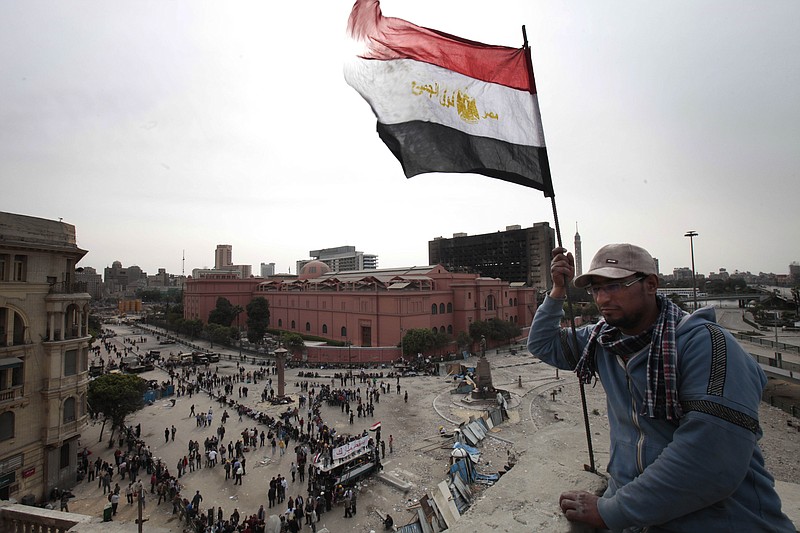CAIRO - Tens of thousands of people packed central Cairo on Friday, waving flags and singing the national anthem, emboldened in their campaign to oust President Hosni Mubarak after they repelled pro-regime attackers in two days of bloody street fights. The U.S. was pressing Egypt for a swift move toward greater democracy, including a proposal for Mubarak to step down immediately.
Thousands including families with children flowed over bridges across the Nile into Tahrir Square, showing they were not intimidated after Mubarak supporters hurled concrete, metal and firebombs at them and fighters on horses and camels trampled them in fighting that began Wednesday afternoon and lasted until Thursday night. The death toll for the two days rose to 11.
In the wake of the violence, more detailed scenarios were beginning to emerge for a transition to democratic rule after Mubarak's nearly 30-year authoritarian reign. The Obama administration said it was discussing several possibilities with Cairo -- including one for Mubarak to leave office now and hand over power to a military-backed transitional government.
Protesters in the square held up signs reading "Now!" in a rally that drew about 100,000 -- the largest gathering since the quarter-million who turned out on Tuesday. They labeled the demonstration the "Friday of departure," in hopes it would be the day that Mubarak goes.
Various proposals for a post-Mubarak transition floated by the Americans, the regime and the protesters share some common ground, but with one elephant-sized difference: The protesters say nothing can be done before Mubarak leaves.
The 82-year-old president insists he will serve out the remaining seven months of his term to ensure a stable process.
Nevertheless, the Obama administration was in talks with top Egyptian officials about the possibility of Mubarak immediately resigning and handing over a military-backed transitional government headed by Vice President Omar Suleiman.
It would prepare the country for free and fair elections later this year, according to U.S. officials speaking on condition of anonymity to discuss the continuing sensitive talks.
Embracing an Egyptian future without Mubarak, Obama pressed the embattled leader to consider his legacy and exit office in a way that would give his country the best chance for peace and democracy. Obama tried to rally world pressure on Mubarak to make "the right decision" but did not call for his immediate resignation.
"I believe that President Mubarak cares about his country. He is proud, but he's also a patriot," Obama said as Cairo remained a center of protest and upheaval.
European Union leaders urged dialogue and an end to violence in Egypt in a cautious joint statement at the conclusion of a one-day summit in Brussels on Friday, ignoring calls by Britain's prime minister to take a stronger stance against a teetering regime.
In Greece, Prime Minister George Papandreou said he would visit Egypt to deliver a message from the 27-nation bloc to Mubarak. Papandreou said he expected the visit to take place Sunday.
EU leaders called on all parties to show "restraint" and said Egypt should start its transition process "now." The cautious statement reflected long-standing divisions in Europe over how to deal with the Middle East and autocrats in allied nations.
"I don't believe we should be dictating to other countries who should be running them," British Prime Minister David Cameron told reporters after the conference ended.
Top defense officials and diplomats also warned Friday that growing unrest in Egypt and elsewhere could affect Israeli and European security, although it may provide new impetus to the Mideast peace process.
NATO Secretary General Anders Fogh Rasmussen said he recognized the need for a democratic solution in Egypt, and suggested it was inevitable. "In the long run no country can resist the will of the people," he said.
Egypt's official Middle East News Agency said Friday that more than 160,000 foreigners have left the country since the start of mass protests demanding the president's ouster.
Airport officials told MENA on Friday that figure only reflected departures through Cairo airport. It did not include the number of tourists who left from smaller airports at the popular Red Sea resorts of Sharm el-Sheikh and Hurghada, or the Mediterranean port city of Alexandria.
Egypt's new vice president had said on state television on Thursday that one million tourists had left the country since the demonstrations began on Jan. 25.
